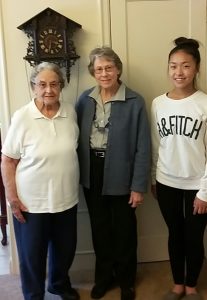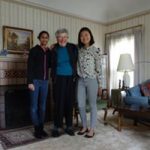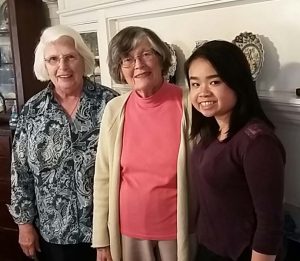AAUW-ALAMEDA/GIRLS IIC INTER-GENERATIONAL WOMEN’S HISTORY INTERVIEW PROJECT 2016
To celebrate the combined contributions to Alameda of three outstanding 50 Year AAUW members, Mary Brownson, Joyce Denyven and Gertrude Woods, Alameda Branch mentors and a team of four Alameda high school students interviewed each of these outstanding women. Nominated by GIRLS IIC, each of the students along with their mentors learned these women’s pioneering professional work in their fields and how the role of women has changed over the years. This project allowed the girls to develop their journalistic skills to write a publishable article as well as gain insight into a unique perspective on Alameda history.
The Golden members were honored at the AAUW-Alameda Branch Luncheon on Saturday May 14, 2016.

Joyce Denyven, (left) AAUW Golden Member, with AAUW Mentor Betty Hatch and Author Ellerbe Whang, GIIC.
Joyce Denyven and the American Association of University Women (AAUW) have had a long history. By long, I’m talking over 60 years! Her story is truly inspiring and reflects the motivated and intellectual woman she is. She is not only a proud educated wife of over 68 years, but also has two daughters and many precious grandchildren who keep her company. Her story goes from Ohio to California, and many journeys along the way. Graduate of University of Cincinnati, a Berkeley High School teacher, Joyce is not only competent, but influential in her community. This is not only proved by her extensive work in the former Alameda Girls’ Club (Girls Inc), but her volunteer service in the Alameda Boy Scouts, Girl Scouts, Welfare Council, PTA, and more.
Her life began in Cincinnati, Ohio, growing up riding street cars since her mother didn’t drive. As a white girl, she had access to almost everything. However, there was an instance in which she was utterly shocked, and her ideas about racial discrimination were crushed. “I had never been in the situation, where I wasn’t able to get what I wanted because of my skin,” she said, reminiscing over a Washington DC lunch counter when she and her friends were escorted to the “white side” after accidentally sitting in the colored area and getting reprimanded by a black man. There was not only discrimination against blacks, but also between girls and boys. She remembered feeling indignant that the boys were further encouraged to take more advanced classes in school, and the Boy Scouts received extra recognition. Against many odds, she graduated college with a Bachelor of Science degree at the University of Cincinnati. She found herself with many job opportunities for teaching since many girls did not qualify for teaching science. Throughout, her mother, Mrs. McManaman was not only influential but encouraged her to do what made her happy. Joyce’s mom played a major role in her life, and even to this day, she is reminded of her mother’s efforts to always take the extra step. Both were involved in church and PTA, she and her mom lived parallel lives, and Joyce has been president of the Presbyterian Women’s Association and was honored with the Honorary Life Ecumenical Mission. She was active in PTA for over 15 years, and was awarded the Honorary Life Membership. Her continuous work in the community has been a blessing to everyone, including Denyven herself.
Working for the Alameda Girl’s Club as Executive Director and being one of the first women to help bring what is now Girls’ Inc to where it is today, has led Joyce to become satisfied with her life, even knowing that she can leave the Earth at any given time. Her achievements could be something easily boasted about, yet she values the hard work she invested rather than the name recognition. As a volunteer, and as an Executive Director of the Girl’s Club, AAUW would like to thank her for her community services to Alameda for over 60 years and counting! Not only has she helped so many people through her kind acts, her personality brightens up many days, including mine as I went to interview her. On the way out, she told me with a kiss on the cheek, “to always stick to what you want to do, not what others tell you that you need to do.” To me, this means to follow my own dreams and to keep my values according to my own beliefs. It was so surprising to meet this woman who was still so vibrant and full of stories to tell. I think the AAUW and I can both agree it’s a pleasure to be with this woman. Thank you again Joyce, for your sheer compassion and steps towards action in Alameda!

Mary Brownson (center), AAUW Golden Member, with Co-Interviewers Eman Khatri and Amy Chu, Amy Chu Author. AAUW Mentor Carolyn Queener not pictured.
Mary Brownson is a long-time member of American Association of University Women (AAUW,) approaching her 50 years of membership in May. Throughout her life, Mary has been a diligent and exceptionally involved individual – from her years spent teaching to the countless hours of volunteering she still does today.
Although Mary was born in Oakland in 1926, she has spent a large portion of her life in Alameda. In her early school years, she attended Versailles – now known as Edison – Elementary, and later promoted to Lincoln Middle School and Alameda High.
She spent her free time reading, playing the piano and singing duets with her friend across the street. At that time, Alameda was a quaint town, containing approximately 35,000 people in the 1930s. Mary, along with the other kids in her friend group, were very friendly with each other, seeing past gender and other differentiating factors. When asked about gender roles growing up, Mary said, “We weren’t boys and girls, we were kids.” At her elementary school age, no one acknowledged a true separation between the sexes. In high school, even when dissimilarities were pointed out, Mary mentioned that close friendships still existed and gender did not create separation in her community.
Along with gender, race was treated similarly in Mary’s community. While Mary attended Versailles, kids from the Japanese colony in Alameda played with the other kids. Ethnic difference and gender was rarely a factor of separation. Mary describes the simplicity of her childhood: “We lived and we didn’t care. We didn’t think about people, they were just friends and relatives.”
Mary mentioned her growing-up experience was unique and she may not have noticed everything, however, her stories emit childhood innocence and the acceptance many communities now strive for.
After she graduated Alameda High, Mary attended college at UC Berkeley, where she met her husband through their shared interest in music; he was a member of Glee Club and she was a member of Treble Clef – the women’s chorus.
At the time, young women had a limited option of careers to pursue and Mary took that into consideration. If she was in college now, she would be involved science and math, but back then, women were only seen as nurses, teachers, secretaries or sales clerks.
After college, Mary and her husband moved to Central Valley, living in Modesto at first, then moving to Stockton and Redding. In Stockton, with two young kids, Mary joined AAUW, and met some very nice individuals. Eventually, she moved to the Alameda Branch of AAUW.
Back in Alameda, Mary now had four children, and while her youngest were attending Edison Elementary, she was president of the PTA and established a library at the school. The principal at the time, Mr. Petersen, pointed out how much time she spent volunteering there, causing Mary to realize herself. As a result, Mary worked at Cal State Hayward – currently Cal State East Bay – and obtained her teaching credentials after two years. For the next 20 years, Mary spent her time working at Lum Elementary.
Her work with Alameda does not stop at her teaching at Lum, however, because she continuously works with organizations that support and improve her community, P.E.O. (PHilanthropic Educational Organization) International being one example. P.E.O. is an interest of Mary’s and helps older working women return to college by granting local scholarships. She also belongs to Prytanean Women’s Honorary Society at Cal, which helps women on 10 year tracks, offering $25,000 in similar scholarships for women. Last and probably not least, Mary regularly volunteers at Alameda Welfare Council, an organization that contributes to local food banks and charities.
Mary has a passion for volunteering and doing good, but she says she never felt like she was out to change the world. She wants to improve it and make it better, by taking part in what she can. For women, Mary’s ideal for the future is open to interpretation; everyone is a unique individual with deviating ideals. She voices, “What is an ideal future for one may not be an ideal future for another.”
She supports when women build up other women to help achieve their goals. Although a certain path does not suit her personally, she encourages everyone to do what they enjoy doing. She states, “I can’t imagine anything worse than going to a job that you don’t like.” Additionally, she makes sure to point out that some women enjoy staying at home and raising the kids. A career is not for everyone.
Whether this female empowerment is labeled feminism or not, she says, “We all have the same goals without labeling it.” When regarding female power figures, she says she may not always agree with them but it is nice to see that women have as much as a chance as men to govern. She adds, “When we get equal opportunity, that’s the important thing.”
To Mary, the most important change in the last fifty years is the change in how women are perceived. Stereotypes regarding careers are less frequent because women are much more than teachers and nurse. She states, “They [women] are mentally capable of doing more.”
When asked for advice based on her experiences, she says it is important to be optimistic when things go wrong.. She says, “Worry about things you can do something [about,] then do it… If something’s gone wrong, learn from it but don’t carry it around as a burden. Life’s too short.”
After pointing out all the ways she has helped Alameda, Mary bashfully admitted, “Yes, if I said I was going to do something, I got it done, somehow.” Although she is not willing to say it, she has contributed to the community in many more ways than one. Mary Brownson is in fact, a very unique individual and honorable member of AAUW.

Gertrude Woods, AAUW Golden Member (center), with GIIC Author Julie Vu, GIIC and AAUW Mentor Honora Murphy
While celebrating her AAUW Alameda 50-year golden membership, I had the honor of interviewing Gertrude Woods. Gertrude was a nationally ranked tennis player and the first female member to be involved in the Recreation Park Department. She was also a PTA (Parent-Teacher Association) member and played a crucial role in establishing the new Alameda Free Library in 2005. This was a project that took thirty years to complete, and this upcoming November will be the 10-year anniversary of the library.
Gertrude loves to read; she obtained a degree in English at UC Berkeley. After graduating high school, she went to Monterey Peninsula College for two years. The faculty members encouraged students to work hard in school in order to get where they want to be. I asked Gertrude specifically how she felt being a female in college, because the majority of those who attended college were male. She said that she did not feel discriminated against because of her gender. However, she noticed that more scholarships were offered to males than females. This was especially apparent because Gertrude went to college during the time when veterans from the Korean War came back to go school, and they were very competitive. Particularly, they also inspired her to succeed. She told me, “The opportunity for girls to go to college is a privilege and for women and men also”.
The mentor that stood out to her the most was the Dean of Women at her High School, who was an active member of AAUW and was very supportive. Fortunately, AAUW decided to split equal scholarships across the area. Gertrude would not have attended college without the scholarships that AAUW provided.
Gertrude’s fantastically inspiring life story would not have been possible and is often well supported by her loving family. Her father grew up in a small town in South Alabama, and he encouraged her to work hard in school because he wanted his children to receive the best education possible. She is married to a mechanical engineer named Peter and has two daughters as well as two sons. She describes her daughters as strong-minded and academically oriented. Her two daughters also graduated from UC Berkeley majoring in the Engineering Department. One of her daughters obtained a degree in chemical engineering and worked for GenenTech.
Along with school, family, community involvement, Gertrude also excelled at sports. Tennis is a sport that requires discipline; it became Gertrude’s lifelong interest that opened many opportunities. She started playing in high school and was the first female member who wanted to play in an intercollegiate sport, despite the fact that there was no provision for girls. There was much opposition against her because she was a girl, but this did not make her to give up the sport that she enjoys. On one of her trips to Stanford University where a Stanford official insisted her to move to another court that was in a bad condition with gopher holes making it very difficult to play. She did not let this occurrence bother her and kept moving on.
For the wisdom of future female generations, Gertrude points out girls need to develop a thicker skin and have a lot of determination. Being a female is not easy, and they have to stand up for themselves. They have to choose their own battles because if a person want to reach to a goal, it is something that they have to earn, not automatically be given. If a girl is in a co-ed classroom with boys, then they will have to be ready to compete alongside the boys and have an optimistic mindset.
The interview with Gertrude made me think back on my experience at the Watermark Conference for Women I attended recently in San Jose. I participated in the coaches’ corner; a coach told me that it is essential for young women to find mentors at an early stage of her career. Guidance will especially give them a sense of direction. Through all her accomplishments Gertrude is a great example of someone giving wise guidance for women to work well.
